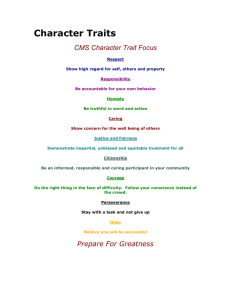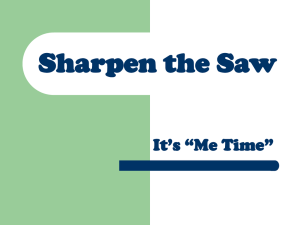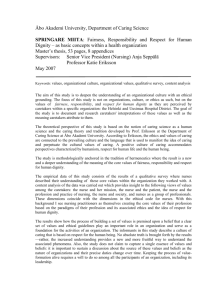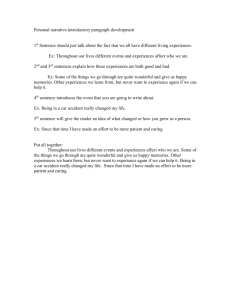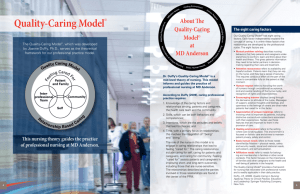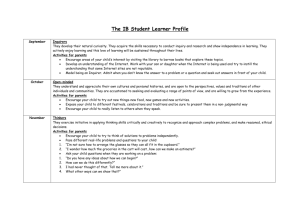Arab Muslim nurses' experiences of the meaning of caring Sandy
advertisement
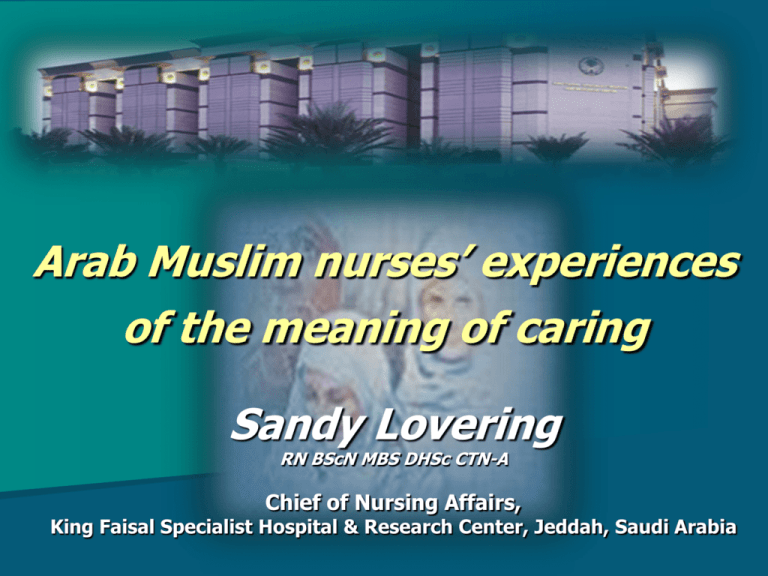
Arab Muslim nurses’ experiences of the meaning of caring Sandy Lovering RN BScN MBS DHSc CTN-A Chief of Nursing Affairs, King Faisal Specialist Hospital & Research Center, Jeddah, Saudi Arabia Arab Muslim nurses’ experiences of the meaning of caring “Saudi nurse leaders: Career choices and experiences” (Lovering, 1996) Do Arab Muslim nurses have a value system and approach to caring for patients that reflects their culture and religion; and what did caring mean to these nurses? “I read about nursing from the West, I think about nursing from the East” “Disconnection between what I learned (Western model) and how I practice” Rufaida Al Aslamya Florence Nightingale The context of caring in the Middle East …. Incorporates the interrelated aspects of Islam and Islamic health beliefs, the family as primary social unit, distinct gender roles the low status of nursing (Daly, 1995; Emami, Benner & Ekman, 2001; Kulwicki,1996; Kulwicki, Miller & Schim, 2000; Lipson & Meleis, 1985; Luna, 1994; Nahas & Amasheh, 1999; Omeri, 1997; Wehbe-Alamah, 2005). Spirituality is a theme that weaves throughout Arab culture and research on nurses’ caring in the Middle East Arab Muslim nurses’ experiences of the meaning of caring Aim: To understand the meaning of caring as experienced by Arab Muslim nurses within the context of Arab culture. Research Questions: 1) What is the explanatory model used by Arab Muslim nurses in the caring experience? 2) What is the meaning of caring as expressed through the narratives of the Arab Muslim nurses? Explanatory Models Health and illness belief systems that influence behavior – What is health, cause of disease, response to illness – What are ways of healing – Roles of others (family, health system) These beliefs construct and inform the nurses’ caring experiences (Good & Good, 1981; Kleinman, 1980; Fitzgerald, Mullavey & Clemson, 1997) Arab Muslim nurses’ experiences of the meaning of caring Research design Qualitative approach Reflexive ethnographic methodology Participants and study context Arab Muslim nurses from Saudi Arabia, Lebanon, Jordan and Egypt caring for Arab Muslim patients in Saudi Arabia over a four year period (2004-2007) Field Experience Nurses’ explanatory model Health, An Islamic Perspective Al-Khayat, WHO 1997 “Health is a state of complete physical, mental and social well being and not merely the absence of disease or infirmity” (WHO) “A complete physical, psychological, social and spiritual well being” (Al-Khayat, 1997) Explanatory Model: belief system Health: – a blessing from God; – obligation to maintain health and accountability to Allah; – state of equilibrium of balance (spirit and body); – health potential In this life, health means the well being of the whole organism, in body, mind and spirit. (Rahman, 1984) Disease and curing are pre destined as God’s will; obligation to seek cure “In the end, all cure is from Allah and not the human” (26:60) “God gives life, and he makes to die (3:156) Test of faith, opportunity for reward, or forgiveness for sins Blending cultural and religious beliefs Evil Eye as supernatural cause of disease or misfortune (Helman, 2001) – Reference in Qur’an (113:1-5) – Protection by saying “Masha’allah” Jinn – “are created by Allah from fire, like humans from dust and angels from light” (AlHilali, 1419) – Good and bad spirits; may cause mental disease Religious healing methods (Ruqyah) – Islamic prayer formulas, religious supplications Care pattern: Spiritual needs may come before Physical needs Spiritual needs before physical needs Humans are judged on the health of inner being; Spiritual disease leads to physical disease, Leading to a priority of meeting spiritual needs over the physical needs the nurses tell us ….. “Spirituality is at the centre of the relationship with Allah; when I have pain I first go to Allah and ask forgiveness for what I have done wrong” Going to the OR (a story) “for Muslim nurses, the ice cream cone is upside down with the spirit at the beginning, whereas in Western nursing, it is the chocolate topping after everything else” Arab Muslim nurse’s explanatory model Health is spiritual, physical and psycho-social well being Islam impacts on all aspects of health, and culture Culture impacts on aspects of health Professional view of health and healing is incorporated into the nurses’ cultural and religious belief system; thus forming a culturally distinct explanatory health beliefs system adopted in care of patients The meaning of caring Caring begins with the relationship between the nurse and Allah the nurses tell us… “In the name of Allah … I pledge to be faithful to my religion, king and nation; To offer myself to this profession through my faith in God” (Dar Al Hekma Nursing pledge, 2006) Nurses practice through their faith in Allah and this is the basis of commitment to nursing (Mebrouk, 2004) “We have the nursing books and the Qur’an; sometimes we are not working by the nursing books, but by the spirit of God” Caring action: Assist the patient’s belief in God Caring action: Assist the patient’s belief in God Actions: use of prayer reading of Qur’an ‘Bisma’allah’ ‘Insha’allah you will be okay Ash-shahaddah while patient dying use of holy water God’s reward for nursing actions You work to live, you work to live the day after. “If anyone has saved a life, it is if he has saved the life of the whole of mankind” (Qur’an 5:23) “Reward comes from patients praying for the nurse” “Reward comes from God as you are doing God’s work” “We are the angels in the air” “We are the angels in the air” Caring actions reinforce patient’s belief in God Watches over patient’s spiritual and physical needs Western angel of mercy: image of purity and caring Meaning of Caring: Shared Spirituality Outpatient setting Dying patient Majali & Lovering, 2007 The Crescent of Care The Crescent of Care Lovering 2008 Values impacting on care Spiritual values: values derived from Islam Cultural values: beliefs from the Arab Muslim worldview Professional values: arising from the profession Components of Caring Spiritual care Psycho-social care Cultural care Interpersonal care Clinical care Components of caring Spiritual care: actions to meet the spiritual needs of the patient and family Cultural care: action to meet cultural needs and supports the values, beliefs and traditions of patient and family Psycho-social care: actions to meet the psychological and social needs of the patient and family (eg. anxiety, family needs) Components of caring (cont’d) Interpersonal care: aspects related to the relationship between the nurse and patients; includes patterns of communication Clinical care: includes knowledge and skills related the physical and technical aspects of care Significance of research Provides the “missing connection” between Western and Arab Muslim nurses’ caring models Beginning framework for Arab Muslim nursing model for practice and education Adds to knowledge on cultural construction of caring in nursing Meaning of caring Spirituality is the essence of caring for Arab Muslim nurses Caring is an act of spirituality Arab Muslim nurses’ experiences of the meaning of caring http://hdl.handle.net/2123/3764 S. Lovering DHSc 2008
